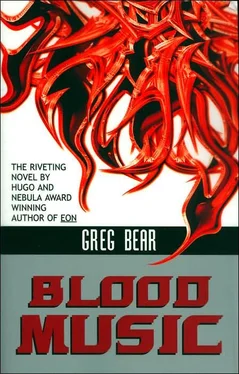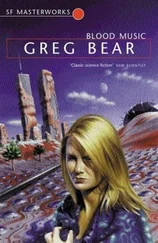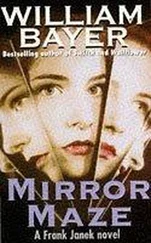Gregory Bear - Blood Music
Здесь есть возможность читать онлайн «Gregory Bear - Blood Music» весь текст электронной книги совершенно бесплатно (целиком полную версию без сокращений). В некоторых случаях можно слушать аудио, скачать через торрент в формате fb2 и присутствует краткое содержание. Город: New York, Год выпуска: 2005, ISBN: 2005, Издательство: ibooks, Incorporated, Жанр: Фантастика и фэнтези, на английском языке. Описание произведения, (предисловие) а так же отзывы посетителей доступны на портале библиотеки ЛибКат.
- Название:Blood Music
- Автор:
- Издательство:ibooks, Incorporated
- Жанр:
- Год:2005
- Город:New York
- ISBN:1596871067
- Рейтинг книги:4 / 5. Голосов: 1
-
Избранное:Добавить в избранное
- Отзывы:
-
Ваша оценка:
- 80
- 1
- 2
- 3
- 4
- 5
Blood Music: краткое содержание, описание и аннотация
Предлагаем к чтению аннотацию, описание, краткое содержание или предисловие (зависит от того, что написал сам автор книги «Blood Music»). Если вы не нашли необходимую информацию о книге — напишите в комментариях, мы постараемся отыскать её.
Blood Music — читать онлайн бесплатно полную книгу (весь текст) целиком
Ниже представлен текст книги, разбитый по страницам. Система сохранения места последней прочитанной страницы, позволяет с удобством читать онлайн бесплатно книгу «Blood Music», без необходимости каждый раз заново искать на чём Вы остановились. Поставьте закладку, и сможете в любой момент перейти на страницу, на которой закончили чтение.
Интервал:
Закладка:
Greg Bear
Blood Music
Interphase
Each hour, a myriad of trillions of little live things—microbes, bacteria, the peasants of nature—are born and die, not counting for much except in the bulk of their numbers and the accumulation of their tiny lives. They do not perceive deeply, nor do they suffer. A hundred trillion, dying, would not begin to have the same importance as a single human death.
Within the ranks of magnitude of all creatures, small as microbes or great as humans, there is an equality of “elan,” just as the branches of a tall tree, gathered together, equal the bulk of the limbs below, and all the limbs equal the bulk of the trunk.
We believe this as firmly as the kings of France believed in their hierarchy. Which of our generations will come to disagree?
Anaphase:
June-September
1
The rectangular slate-black sign stood on a low mound of bright green and clumpy Korean grass, surrounded by irises and sided by a dark cement-bedded brook filled with koi. Carved into the street side of the sign was the name GENETRON in Times Roman letters of insignia red, and beneath the name the motto, “Where Small Things Make Big Changes.”
The Genetron labs and business offices were housed in a U-shaped, bare concrete Bauhaus structure surrounding a rectangular garden court. The main complex had two levels with open-air walkways. Beyond the courtyard and just behind an artificial hummock of earth, not yet filled in with new greenery, was a four-story black glass-sided cube fenced with electrified razor-wire.
These were the two sides of Genetron; the open labs, where biochip research was conducted, and the defense contracts building, where military applications were investigated.
Security was strict even in the open labs. All employees wore laser-printed badges and non-employee access to the labs was carefully monitored. The management of Genetron—five Stanford graduates who had founded the company just three years out of school—realized that industrial espionage was even more likely than an intelligence breach in the black cube. Yet the outward atmosphere was serene, and every attempt was made to soft-pedal the security measures.
A tall, stoop-shouldered man with unruly black hair untangled himself from the interior of a red Volvo sports car and sneezed twice before crossing the employee parking lot. The grasses were tuning up for an early summer orgy of irritation. He casually greeted Walter, the middle-aged and whippet-wiry guard. Walter just as casually confirmed his badge by running it through the laser reader. “Not much sleep last night, Mr. Ulam?” Walter asked.
Vergil pursed his lips and shook his head. “Parties, Walter.” His eyes were red and his nose was swollen from constant rubbing with the handkerchief that now resided,abused and submissive, in his pocket.
“How working men like you can party on a weeknight, I don’t know.”
“The ladies demand it, Walter,” Vergil said, passing through. Walter grinned and nodded, though he sincerely doubted Vergil was getting much action, parties or no. Unless standards had severely declined since Walter’s day, nobody with a week’s growth of beard was getting much action.
Ulam was not the most prepossessing figure at Genetron. He stood six feet two inches on very large flat feet. He was twenty-five pounds overweight and at thirty-two years of age, his back hurt him, he had high blood pressure, and he could never shave close enough to eliminate an Emmett Kelly shadow.
His voice seemed designed not to win friends—harsh, slightly grating, tending toward loudness. Two decades in California had smoothed his Texas accent, but when he became excited or angry, the Panhandle asserted itself with an almost painful edge.
His sole distinction was an exquisite pair of emerald green eyes, wide and expressive, defended by a luxurious set of lashes. The eyes were more decorative than functional, how– ever; they were covered by a large pair of black-framed glasses. Vergil was near-sighted.
He ascended the stairs two and three steps at a time, long powerful legs making the concrete and steel steps resound. On the second floor, he walked along the open corridor to the Advanced Biochip Division’s joint equipment room, known as the share lab. His mornings usually began with a check on specimens in one of the five ultracentrifuges. His most recent batch had been rotating for sixty hours at 200,000 G’s and was now ready for analysis.
For such a large man, Vergil had surprisingly delicate and sensitive hands. He removed an expensive black titanium rotor from the ultracentrifuge and slid shut the steel vacuum seal. Placing the rotor on a workbench, one by one he removed and squinted at the five squat plastic tubes suspended in slings beneath its mushroom-like cap. Several well-defined beige layers had formed in each tube.
Vergil’s heavy black eyebrows arched and drew together behind the thick rims of his glasses. He smiled, revealing teeth spotted brown from a childhood of drinking naturally fluoridated water.
He was about to suction off the buffer solution and the unwanted layers when the lab phone beeped. He placed the tube in a rack and picked up the receiver. “Share lab, Ulam here.”
“Vergil, this is Rita. I saw you come in, but you weren’t in your lab—”
“Home away from home, Rita. What’s up?”
“You asked me—told me—to let you know if a certain gentleman arrived. I think he’s here, Vergil.”
“Michael Bernard?” Vergil asked, his voice rising.
“I think it’s him. But Vergil—”
“I’ll be right down.”
“Vergil—”
He hung up and dithered for a moment over the tubes, then left them where they were.
Genetron’s reception area was a circular extrusion from the ground floor on the east corner, surrounded by picture windows and liberally supplied with aspidistras in chrome ceramic pots. Morning light slanted white and dazzling across the sky-blue carpet as Vergil entered from the lab side. Rita stood up behind her desk as he passed by.
“Vergil—”
“Thanks,” he said. His eyes were on the distinguished-looking gray-haired man standing by the single lobby couch. There was no doubt about it; Michael Bernard. Vergil recognized him from photos and the cover portrait Time Magazine had printed three years before. Vergil extended his hand and put on an enormous smile. “Pleased to meet you, Mr. Bernard.”
Bernard shook Vergil’s hand but appeared confused.
Gerald T. Harrison stood in the broad double door of Genetron’s fancy for-show office, phone receiver gripped between ear and shoulder. Bernard looked to Harrison for an explanation.
“I’m very glad you got my message…” Vergil continued before Harrison’s presence registered.
Harrison immediately made his farewells on the phone and slammed it on its cradle. “Rank hath its privileges, Vergil,” he said, smiling too broadly and taking a stance beside Bernard.
“I’m sorry—what message?” Bernard asked.
“This is Vergil Ulam, one of our top researchers,” Harrison said obsequiously. “We’re all very pleased to have you visiting, Mr. Bernard. Vergil, I’ll get back to you later about that matter you wanted to discuss.”
He hadn’t asked to talk to Harrison about anything. “Sure,” Vergil said. He rankled under the old familiar feeling: being sidestepped, pushed aside.
Bernard didn’t know him from Adam.
“Later, Vergil,” Harrison said pointedly.
“Sure, of course.” He backed away, glanced at Bernard pleadingly, then turned and shambled back through the rear door.
Читать дальшеИнтервал:
Закладка:
Похожие книги на «Blood Music»
Представляем Вашему вниманию похожие книги на «Blood Music» списком для выбора. Мы отобрали схожую по названию и смыслу литературу в надежде предоставить читателям больше вариантов отыскать новые, интересные, ещё непрочитанные произведения.
Обсуждение, отзывы о книге «Blood Music» и просто собственные мнения читателей. Оставьте ваши комментарии, напишите, что Вы думаете о произведении, его смысле или главных героях. Укажите что конкретно понравилось, а что нет, и почему Вы так считаете.












